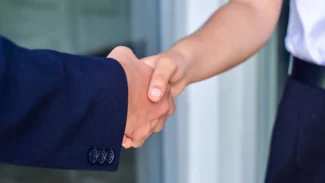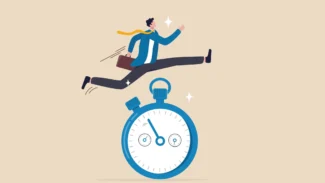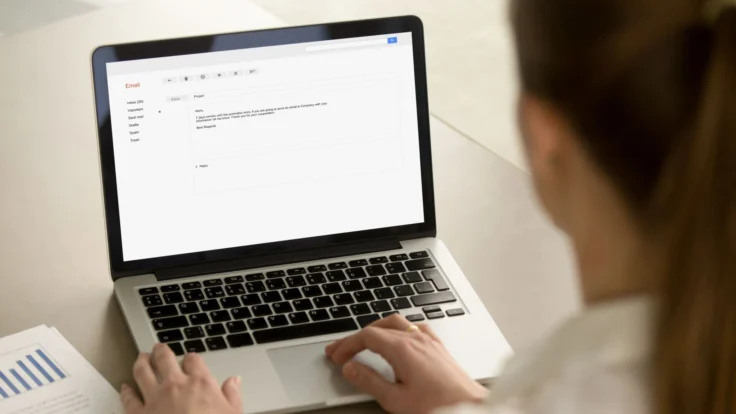- Why Should You Write a Thank You Note After Your Interview?
- Elements To Include in a Thank You Email After an Interview
- When To Send a Thank You Email After an Interview
- Sending a Thank You Email After an Interview to Multiple Interviewers
- Sample Thank You Emails
- Entry-Level Candidate Thank You Email
- Is It Worth Writing a Thank You Email After an Interview?
- Related Posts
When you write your resume, your goal is to stand out. But what happens after you ace the interview? One more step can set you apart: sending a thank-you email.
Why is a thank-you email so important? It demonstrates your initiative and good manners, leaving a lasting impression on potential employers.
In this guide, we’ll share expert tips and examples to help you write an impactful thank-you email that enhances your chances of landing the job.
Why Should You Write a Thank You Note After Your Interview?
As discussed, sending a thank-you email after an interview can be a decisive factor in distinguishing yourself from other candidates. This simple gesture reinforces your interest in the position and showcases your professionalism and gratitude.
There are several reasons for this:
- Keeps you top of mind: With multiple candidates vying for the same position, a thank-you note helps keep you memorable.
- Influences hiring decisions: About 80% of companies consider thank-you notes in their hiring decisions. Nearly 20% of hiring managers have dismissed candidates for not sending one.
- Demonstrates positive qualities: A thank-you email showcases qualities like self-motivation and people skills, which are often highlighted in resumes. It also serves as a reminder of why you are the best candidate for the role.
- Shows gratitude: Gratitude is valued in the workplace. Employees who express it tend to have better emotional health, less stress, and higher job satisfaction, contributing to a positive work environment.
- Enhances suitability for certain roles: A thank-you note can be particularly impactful for jobs requiring empathy and communication, such as customer service or social services.
- Improves chances after a tough interview: Even if the interview didn’t go as planned, a thank-you note can help tip the scales in your favor, as you never know how other candidates performed.
Elements To Include in a Thank You Email After an Interview
As already noted, post-interview thank-you emails are few and far between. Likely, you’ll be one of only a few candidates to write one. Thanks to this guide on how to send a thank you email after an interview, you’ll also write the best thank you possible.
If you follow these steps, you’ll master the art of the thank you email and land the job you’re looking for.
1. Email subject lines
Crafting an effective subject line for your interview thank-you email can help ensure it stands out in the interviewer’s inbox.
Consider the following approaches to write yours.
Simple
- Thank You—[first name, last name]: This straightforward subject line clearly identifies the sender and the purpose of the email.
- Thank You—[job title]: Mentioning the job title helps the interviewer quickly recall the context of the interview.
- Thank you for the interview: A simple and effective subject line that directly conveys gratitude.
Personalized
- Thank you for the interview for the [role]: Including the specific role helps the interviewer remember the context, which is especially useful for companies hiring for multiple positions.
- Thank you for the phone interview: Specific to phone interviews, this subject line clarifies the type of interview conducted.
Casual
- Great to meet you today: Suitable for companies with a laid-back culture or if the candidate has a good rapport with the interviewer.
- Thanks for chatting this morning: Adding the time of day personalizes the subject line and makes it more specific.
Appreciative
- Appreciated our interview discussion: Expresses gratitude for the discussion, showing that the candidate values the interviewer’s time and insights.
- Grateful for meeting the [company name] Panel: This subject line is suitable for panel interviews and shows appreciation for the interviewers’ collective effort.
2. Address the interviewer
Ideally, you have the direct email address of the interviewer or hiring manager. It is better to send the thank you email directly to this person than to a general company inbox.
Even if you don’t have a direct email address, note the interviewer’s name in the subject line. Use their name in the greeting of the email body as well.
3. Thank them for their time
Businesspeople are busy people. The purpose of this email is to thank them, so do this in the first sentence of the email. You can thank them for their time, for taking the time to speak with you.
Here are some examples of ways to thank interviewers for their time:
Simple
- “Thank you for taking the time to meet with me.”
- “I appreciate the opportunity to interview for the [job title] position.”
Personalized
- “Thank you for the interview on [date]. I enjoyed learning more about [company name] and the [job title] role.”
- “I appreciate the opportunity to discuss how my background in [specific skill/experience] aligns with the needs of your team.”
Appreciative
- “Thank you for the insightful conversation about [specific topic]. It further solidified my interest in the [Job Title] position.”
- “I am grateful for the opportunity to interview with [company name] and discuss how my experience in [Relevant Field] can contribute to your team.”
Detailed
- “Thank you, [interviewer’s name], for the opportunity to discuss the [job title] role. I am excited about possibly contributing to [company name].”
- “I appreciate the chance to interview for the [job title] position and discuss how my skills in [specific area] can benefit your team.
4. Express interest in what you learned
During the interview, you probably learned things that you didn’t already know about the company.
After thanking the interviewer for their time, tell them that it was a pleasure learning about the company.
Cite something specific if possible. Many companies want enthusiastic employees, and this shows your sincere interest in the company and the position.
Here are examples of ways to make a strong impression:
- Reference key parts of the conversation
For instance, you could say, “It was great to hear about [company] goals for streamlining your software and placing emphasis on quality UX design.”
This highlights your engagement and interest in the company’s objectives.
- Highlight company goals and projects
“It was super interesting to hear where the [company] is headed.”
This shows you are excited about the company’s future and how you might contribute.
- Discuss specific roles and responsibilities
You might write, “Based on our conversation, it sounds like you’ve currently got strong fundamentals in place for the paid search program, but at this point in the company’s lifecycle, you need to improve the ROI of the paid search program while continuing to scale up acquisition.”
Another way to show your interest in the role is by demonstrating your understanding of the role and how you can add value.
- Share personal career insights
Sharing what you learned about the interviewer’s career or the team can personalize your thank-you note.
For instance, “I enjoyed learning more about your career trajectory at [Company].”
This shows your interest in the role and the people you might be working with.
- Reflect on specific projects or initiatives
Mentioning specific projects or initiatives discussed during the interview can show that you are already thinking about how you can contribute.
For example, “I had a fantastic time chatting with you, especially about your upcoming [example] implementation.”
This indicates that you are eager to be part of the team and contribute to its success.
- Reiterate your fit for the role
Reiterating how your skills and experiences align with the role can reinforce your suitability for the position.
For instance, “After our conversation, I am confident that my skills in business writing and experience as a copy editor are a great match for this opportunity.”
5. Solve a problem
Can you demonstrate how you would solve a problem the company faces? Think about the company’s mission in general, or an economic, technical, or supply chain issue facing many companies in the industry.
Cite the problem by saying, “I was thinking about what you said about…” Then explain how your experience sheds light on a solution.
Note that you should use extreme caution when wording this section of your email. You don’t want to come across as a know-it-all or someone who does not respect authority.
You might say something like, “In my previous role as [job title] with [company], I found that using [cite the solution] [increased/decreased/improved] [cite an aspect of the work] by [X] percent.”
Addressing the problem and solution in this way demonstrates your expertise and a definitive example of your problem-solving skills in the past. You can conclude this portion of the email with the words, “I’m sure this experience will yield similar success as your new [cite position you are hoping to obtain].”
This aspect will set your thank you note apart from all the others. It shows further initiative and gives the interviewer a sample of your work.
6. Close with gratitude
You opened your letter with thanks, and you should close it with thanks. Invite the interviewer to contact you if they need additional information. Say that you look forward to hearing from them. Thank them once again for their time.
7. Include your contact information
Sign the email with your full name (first and last name), phone number, and email address. Yes, it is true that the interviewer already has this information. But if you give it to them again, they don’t have to hunt for it.
You can also include a link to your professional website or LinkedIn profile if you so desire.
What about sending a handwritten thank you card in the mail? While this is a very personal touch, it should only be used in specific industries (for example, if you are applying to a law firm, a wedding planning company, or a C-level position) or if no email address is available – an uncommon situation in this technological age.
What not to say in a thank you email after an interview
When writing a thank-you email after an interview, you’ll need to strike the right tone and avoid common pitfalls that can undermine your professionalism and sincerity.
Wrong ❌
Steer clear of these to leave a positive impression:
- Avoid generic and canned messages
- Do not fake enthusiasm
- Avoid apologizing for delays
- Do not include gifts or gift cards
- Avoid casual language
- Do not highlight mistakes
- Avoid making requests
- Avoid long and detailed messages
When To Send a Thank You Email After an Interview
You should always send your thank you within 24 hours of the interview. Ideally, you should go home and write your note the same day.
Why should you send your email so soon after the interview?
Sending your thank-you email soon after the interview is important because it keeps the conversation fresh in the interviewer’s mind, demonstrating your eagerness and professionalism.
Ideally, you should send the email within 24 hours to express appreciation while the details of your interview are still vivid, which helps reinforce the positive impression you made during the meeting.
Sending a Thank You Email After an Interview to Multiple Interviewers
Have you gone on multiple interviews? Should you send a thank you to all of your interviewers?
The simple answer is yes, you should. However, take care to personalize the thank you note for each interviewer. It’s okay to create a template like the one below, but re-read it before you hit send. You would not want to mention the wrong company accidentally!
In some cases, you may be interviewed by multiple persons at the same company. Again, you should send a personalized thank you email to each of the interviewers. Don’t send the same email because they may share the notes with one another as they discuss the candidates.
Add or mention how your role can provide support or add value to their department’s initiatives if you are hired for the open role.
If you don’t have direct contact information for every interviewer, you can send an email to the one you do and ask them to share it with the others.
If you get called in for a second interview with the same hiring manager, send a thank you email the second time as well. Be sure to personalize the second email as much as the first by mentioning specifics from the second interview.
What if you get a call that you’ve been accepted to one of the positions you applied to? Should you still thank the other interviewers? Yes. Why? Networking is crucial in the business world.
Thanking the interviewer and telling them you’ve accepted another job leaves them with a favorable impression. You might leverage that goodwill at some future time – in business-to-business interactions or when seeking a job.
💡Tip
If the interview made you realize that the job in question is not right for you, send a thank you note and clearly and respectfully state that you’d like to decline the position or that the role would not fit your career trajectory. This will save the interviewer time, and they will appreciate that. This will leave the door open for possible positive interactions in the future.
Sample Thank You Emails
Are you still feeling a bit stuck on what to write in your thank you email? Use the samples below, and customize them to fit your needs.
Hello [Interviewer’s name],
I wanted to thank you for taking the time to meet with me and discuss [the position title] at [company’s name]. It was interesting to hear about [specific project or initiative discussed]. Based on our conversation, it sounds like you currently have strong fundamentals in place for [specific area].
I’ve been thinking a great deal about what you said about [cite a problem or challenge the company is facing]. During my time at [previous company], I found it effective to [site solution]. In fact, [the solution] resulted in an [increase/decrease/improvement in the problem] of [X] percent.
I am confident that my experience will yield similar positive results to your new [cite position].
I wanted to send this note promptly to express my gratitude and enthusiasm for the opportunity. If you require any additional information from me, please feel free to contact me.
I look forward to hearing from you [on a specific date or within a specified timeframe, if applicable].
Again, thank you for your time!
Sincerely,
[First and last name]
[Phone number]
[Email address]
Entry-Level Candidate Thank You Email
What if you’re applying to an entry-level position and you feel that the above thank you note is a bit too formal? Try the following thank you note sample for size. It is specially designed for small companies or those with a relaxed atmosphere.
Subject: Thanks for the Interview!
Hi [Interviewer’s name],
I enjoyed learning about the rewards and challenges of working as a [position title] at [company name]. I am excited to join your team and help [cite a responsibility or two of the position in question].
Please feel free to contact me if you need any more information. I look forward to your call. Again, thank you for your time.
Sincerely,
[First and last name]
[Phone number]
[Email address]
As a postscript to this conversational email, you can even mention something extraneous that you discussed during the interview.
You can mention that you hope the interviewer enjoyed whatever they mentioned they’d be doing after work, or that you tried a restaurant, movie, etc. that they suggested. This builds rapport and suggests friendly working conditions if you are hired. Also, it shows gratitude and your active listening skills.
If you still feel like your thank you email doesn’t quite make the grade, even after utilizing these tips and this sample, consider this – any thank you note can put you ahead of the competition since many candidates never send one.
Is It Worth Writing a Thank You Email After an Interview?
Writing a thank-you note after an interview is a simple yet powerful way to stand out from other candidates. Despite its importance, most interviewees neglect this step, but sending a thank-you note can significantly enhance your candidacy.
A well-crafted thank-you note demonstrates your appreciation and professionalism, reinforces your interest in the role, and highlights your qualifications.
By taking this extra step, you show that you respect the interview process and are serious about the opportunity.
Remember to include the following elements:
- Thank the interviewer(s) for their time
- Cite something you learned during the interview
- Demonstrate how you would solve a problem that was mentioned during the interview
Lastly, be sure to send the email within 24 hours of your interview.
Related Posts





